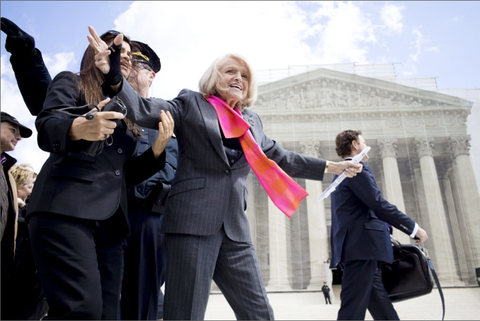 Christopher Gregory/The New York Times Edith Windsor, the plaintiff in the Defense of Marriage Act case, appeared on the steps of the Supreme Court after the ruling.
Christopher Gregory/The New York Times Edith Windsor, the plaintiff in the Defense of Marriage Act case, appeared on the steps of the Supreme Court after the ruling.
The Cost of Being Gay
A look at the financial realities of same-sex partnerships.
Today’s Supreme Court decisions on gay marriage raise new questions about the expansion of rights and benefits to same-sex couples. Tara Siegel Bernard, in her series on this blog and in Your Money columns, has examined the complicated personal finance issues surrounding gay marriage and Social Security, income and estate taxes, health insurance and other factors that will change along with marriage laws. We have gathered the most relevant articles and blog posts here.
- However Justices Rule, Issues Remain The outcome of the cases before the Supreme Court does not necessarily resolve all the complicated financial and legal hurdles that confront same-sex couples.
- The High Price of Being a Gay Couple A comparison of the extra health, legal and other costs borne by a hypothetical gay couple whose financial situation is otherwise similar to a heterosexual couple’s.
- Is Tax Software Sophisticated Enough for Same-Sex Couples? The shortcomings of tax-preparation software programs in addressing the complex state and federal tax issues of gay couples.
- When Gay Employees Can Enroll Spouses for Health Insurance What you need to know, and ask, about qualifying for benefits through a gay partner’s employer.
- I.R.S. Denied Lesbians Legitimate Adoption Credit How the adoption tax credit has been applied, or denied, to gay partners raising children.
- How Gay Marriage Will Change Couples’ Financial Lives A checklist of the financial issues, from inheritance to parental rights, that are particular to gay couples who wed.
- Tax Changes for Gay Married New Yorkers A look at the tax situation for gay couples in New York State after the legalization of same-sex marriage.
- Married Gay Couples ‘Refuse to Lie’ on Tax Forms How some same-sex couples defied the Defense of Marriage Act by filing jointly.
Continuing coverage is also available on the Bucks blog as part of the series “The Cost of Being Gay.”
Article source: http://bucks.blogs.nytimes.com/2013/06/26/same-sex-marriage-and-personal-finances-further-reading/?partner=rss&emc=rss
